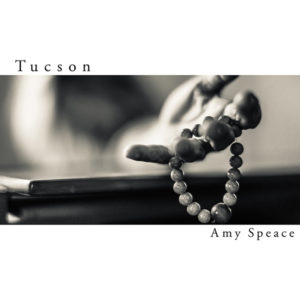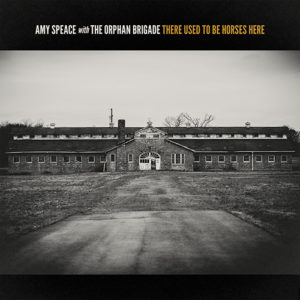 Official Website Instagram Facebook Twitter Spotify Apple Music
Official Website Instagram Facebook Twitter Spotify Apple Music
Beautifully uplifting and deeply personal, Amy Speace has made the most revealing album of her career with There Used to Be Horses Here. Recorded in Nashville in just four days, the award-winning songwriter pulls directly from her own childhood memories, coming of age in New York City, and losing a parent while learning to become one.
In its most powerful moments, the album sets Speace’s majestic voice to symphonic arrangements, yet her songwriting remains intimate and emotional. As a fan and friend of the Nashville band The Orphan Brigade, she invited its three members to collaborate as songwriters and co-producers, inspired by their persistent rhythms and sweeping sonic palette. Remembering her vocal sessions, she says simply, “While I was singing over what those guys were playing, it made me feel like I was flying.”
While many of the subjects are heavy, There Used to Be Horses Here isn’t a sad record. Instead it’s a direct reflection of the 12 months between her son’s first birthday and the loss of her dad, propelled by a playwright’s eye for detail and a performer’s gift of vocal delivery.
“I wanted these lyrics to be honest. I got tired of circling around a subject, so I decided that I’m just going to write exactly what I feel,” she says. “It’s funny to me that the best songs I have written have been since my son was born, when I thought I was going to lose all creative powers to mothering – and it didn’t happen. It kicked it into high gear and made me think, ‘I may not have much time left on the planet. Maybe I should just get to the point.’”
The album opens with “Down the Trail,” which ties together a childhood memory of her father’s, as well as something he said to her in his final days. The vivid imagery also carries over into the title track, which finds a fondly-remembered family destination erased by progress. In the compositions that follow, Speace imagines the train that takes away her father’s body (“Hallelujah Train”), the remembered interactions between father and daughter (“Father’s Day”), and the lingering pain of loss (“Grief Is a Lonely Land.”)
A conservative businessman, Speace’s father was admittedly uninterested in art and not one to share emotions with his family – or anyone, really. However, when he began to see his daughter as a hard-working, dedicated, small business owner, his perception of her career path changed. Speace recalls that he soon became the most supportive member of her family. In his later years, he would often collect news articles that he thought might inspire a song, or send along lists of potential titles.
“He was my hero and he was my sharpest critic. We had very tangled, antagonistic relationship until about seven years ago, and then we got very close,” she says. “I was there for the last seven days of his life. Part of me being there for my dad was my amends for everything that I put him through. I really wanted to be there, holding his hand when he died, and I was there.”
The turning point of There Used to Be Horses Here may be “One Year,” which she wrote on her porch while cradling her infant son, Huckleberry. Upon his birth in 2018, she became a first-time mother at the age of 50. Meanwhile, “Give Me Love,” portrays a happy romantic relationship that mirrors her marriage.
Perhaps the collection’s most haunting moment, “River Rise” captures the urgency of the sessions for There Used to Be Horses Here. Speace observes that every vocal performance on the album is the first or second take, and that the musicians in the room are finding their way in the moment. The approach sums up her goal as a producer: “You need to make sure you press ‘Record’ while musicians are fumbling, because while they’re trying it out is when the magic happens. You should never let anything be perfect.”
Growing up in Baltimore as the oldest child of four, Speace discovered music, words and a love of language early on. Her grandmother taught her to read at 3 years old by reading street signs. By 5 she was writing poetry, and by 8 she’d learned to play piano. Over the next decade, the family moved often, then Speace enrolled in Amherst College in Massachusetts. Not knowing what where to go after graduation, she took her professors’ advice and moved to New York City in 1991.
“I wanted to live in the Village,” she says. “I wanted to live around the drunk writers and figure out what artistic expression I wanted to gravitate toward, because I was a singer, a playwright, an actress, a poet – I hadn’t yet written my first song.”
Writing her first song in her mid twenties while living in Greenwich Village, she taught herself “sound shapes” on guitar, highly influenced by Joni Mitchell’s compositional music and poetically direct lyrics. As she honed her talent as a songwriter, guitarist, and performer, she landed gigs at CBGB’s, The Living Room, and The Bitter End, and became entrenched in New York City’s nightlife -- a moment in her life that cinematically unfolds in flashback in “Shotgun Hearts.” Although she’s now lived in Nashville since 2009, she frequently cites New York City as her hometown.
Speace established new friendships and creative partnerships in Music City by launching the East Nashville Song Salon in 2010, which is still thriving today (although she passed on the reins since her son was born.) Her many champions from the folk world have included Judy Collins, Mary Gauthier, and Kathy Mattea, to name only a few. She’s cultivated a significant audience in the UK and Europe as well. The title track of her prior album, Me and the Ghost of Charlemagne, was named International Song of the Year by the Americana Music Association UK in 2020.
As There Used to Be Horses Here winds down, the softly-sung “Mother Is a Country” feels like a lullaby for her toddler son, while a rendition of Warren Zevon’s “Don’t Let Us Get Sick” serves as a benediction of sorts. There’s a warmth and sincerity to the recording that feels perfect for an encore.
“I feel the most ‘me’ when I’m on stage,” Speace says. “I’m not afraid on stage because it’s like a conversation between me and my notion of what God is, and I’m just inviting other people into that conversation.”



